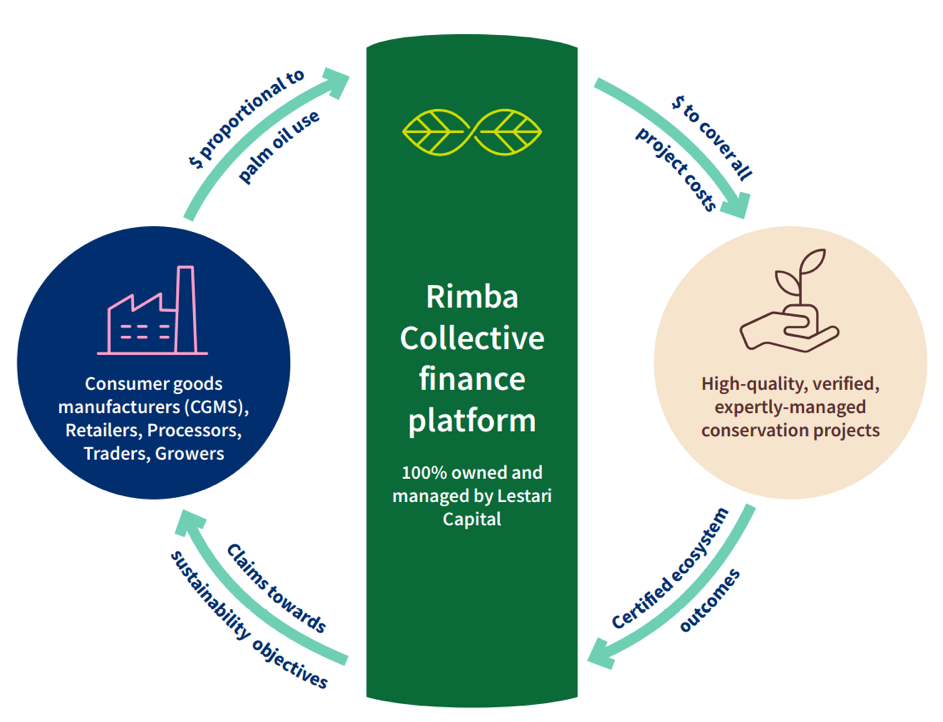Under the heading ‘Securing Sustainability in Turbulent Times’, the fourth Sustainable Palm Oil Dialogue (SPOD) took place in Amsterdam, Netherlands, in October 2022.
In a much-noticed Breakout Session, “Innovative ideas: delivering sustainable palm oil now!”, Neil Judd, Senior Advisor at Lestari Capital, presented what he called the Rimba Collective.
Who is Lestari and what is the Rimba Collective?
Lestari Capital
Lestari Capital is a company that aims to connect markets with conservation efforts. It finances projects on the ground that rely on efficient and ethical mechanisms to promote more equitable outcomes.
The claim on the official website states: “We develop innovative business models that conserve natural ecosystems, restore landscapes, support communities, and tackle climate change.”
Lestari starts from the proposition that securing a sustainable future requires not only stopping environmental degradation and the loss of biodiversity, but also reversing them. This is an approach Lestari calls “nature positive.”
The company is based in Southeast Asia and sees its role in linking high-impact conservation projects with “responsible” finance at scale. Its finance platform can take one of these three forms:
- Collectives (for collaborations)
- Solutions (for compliance)
- Climate (for carbon markets)
The project presented at SPOD was a collective named Rimba.
The Rimba Collective
In the Indonesian as well as the Malay languages, Rimba means “natural forest”. Thus, the collective´s name already points to its purpose: to conserve and restore forests. Buyers and processors of palm oil are leading the initiative.
Consumer goods companies Nestlé, PepsiCo, Procter & Gamble, and the Asian agricultural group Wilmar, one of the world’s largest processors and distributors of palm oil, are its founding members. They join forces with Unilever to protect forests.
The ambition is to protect and restore more than 500,000 hectares of tropical forest landscapes in Southeast Asia. At the same time, the Rimba Collective also aims to promote the local economy and create jobs for local communities. Ultimately, the goal is to provide USD1 billion and support 32,000 people in forest communities throughout Southeast Asia over 30 years, starting in Indonesia and Malaysia. Participants’ contributions are directly correlated with palm oil purchase volumes.
Benjamin Ware, Global Head of Sustainable Sourcing and Climate Delivery at Nestlé remarked:
“We know that addressing deforestation in our palm oil supply chain is not enough. For a lasting and meaningful impact, we are evolving from a no-deforestation strategy to a ‘forest-positive’ one. This means we will buy from suppliers who are actively conserving and restoring forests while promoting sustainable livelihoods and respecting human rights.”
The financial model that the Rimba Collective uses has two primary features:
- Costs, i.e., participants´ contributions, are linked to their procurement volumes, thus directly integrating Rimba Collective costs into procurement decision-making.
- Contributions and contractual obligations flow directly from participants to so-called Special Purpose Vehicles (SPV), managing funds on their behalf.
The following diagram clarifies how the concept works:

Rimba Collective began operations in April 2021. The initiative plans to eventually venture beyond Indonesia and Malaysia, across all of Southeast Asia. Lestari and its partners aim to become one of the largest private-sector forest conservation initiatives, and are looking to attract more corporate partners to achieve this.
Projects are prioritised based on their potential in protecting and restoring large, contiguous areas of natural ecosystems and critical habitats. Measurable ecosystem benefits (e.g., more carbon is stored in the soil, water is purified, or soil health is improved) and enhanced livelihoods for local communities are among its key parameters. All projects are third-party verified.
Conclusion
The aims Lestari Capital and the Rimba Collective pursue are surely commendable. Nevertheless, the language employed in the company´s communication sometimes appears a bit flowery. It is in part a hodgepodge of the right buzzwords from “change agent for ecosystems”, and “equitable market mechanisms delivering lasting conservation outcomes” to “ethical participation”.
Furthermore, in financial terms, USD1 billion spreads out over 30 years amounts to USD3.3 million per year. Given the scope and nature of the problem, it is not overly ambitious for Rimba Collective to undertake this with some of the largest corporations in the world on board.
On the other hand, making global palm oil production truly sustainable is a long-term proposition, and each contribution towards that goal is welcome.
Certainly, when a representative of Nestlé says that its company aims to base its buying decisions on whether a supplier actively protects forests or not, palm oil producers should take note. Therefore, it is not unreasonable to expect that harvesting sustainable palm oil may happen sooner with the Rimba Collective, than without it.

